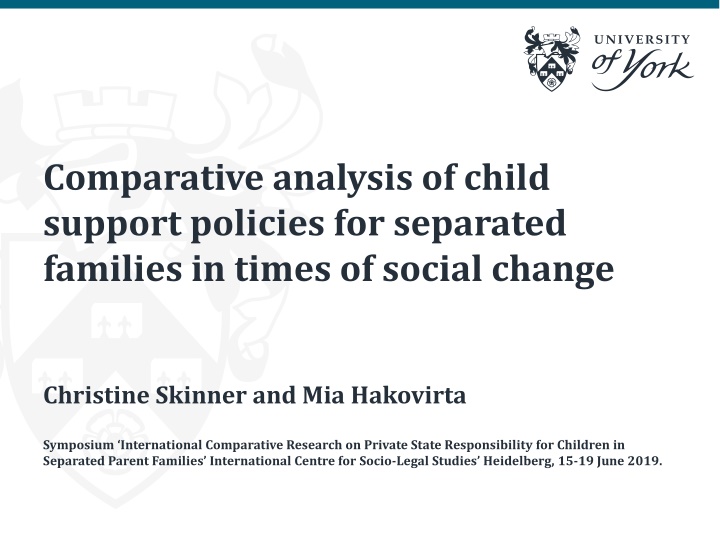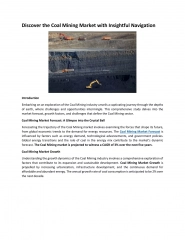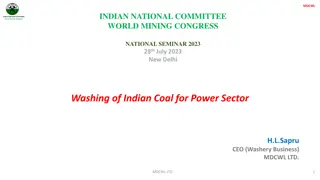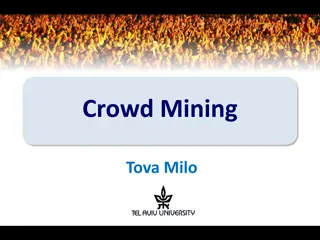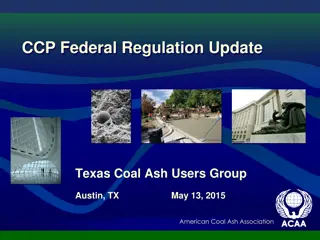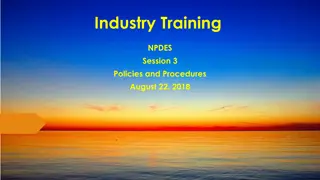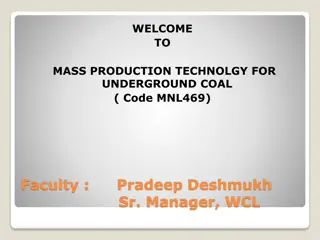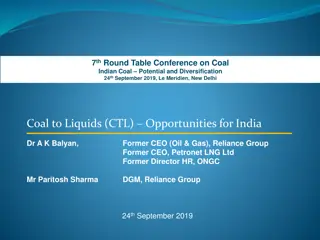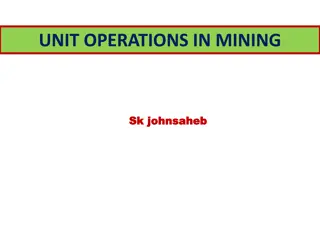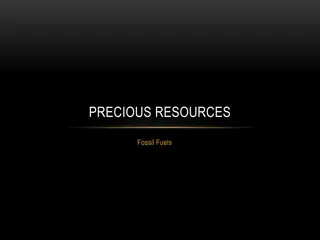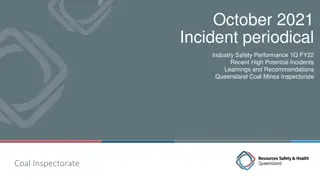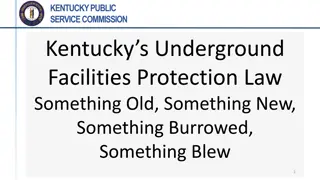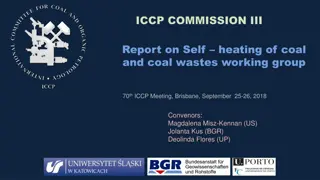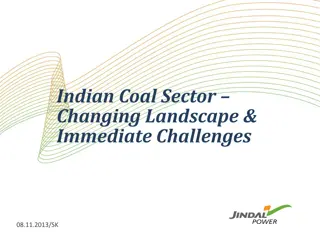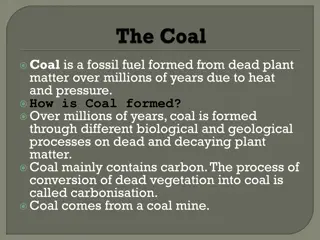Mass Production Technology for Underground Coal Mining
India, as the third largest hard coal producing country globally, faces the challenge of increasing coal production to meet growing demand. This course delves into the status of coal mining, the need for mass production technology in the Indian coal sector, and techniques like continuous mining and longwall mining. With insights on system analysis, equipment selection, and case studies, this program equips participants with knowledge essential for efficient coal extraction. Explore the syllabus, recommended books, and class schedule to deepen your understanding of underground coal mining.
Download Presentation

Please find below an Image/Link to download the presentation.
The content on the website is provided AS IS for your information and personal use only. It may not be sold, licensed, or shared on other websites without obtaining consent from the author.If you encounter any issues during the download, it is possible that the publisher has removed the file from their server.
You are allowed to download the files provided on this website for personal or commercial use, subject to the condition that they are used lawfully. All files are the property of their respective owners.
The content on the website is provided AS IS for your information and personal use only. It may not be sold, licensed, or shared on other websites without obtaining consent from the author.
E N D
Presentation Transcript
Comparative analysis of child support policies for separated families in times of social change Christine Skinner and Mia Hakovirta Symposium International Comparative Research on Private State Responsibility for Children in Separated Parent Families International Centre for Socio-Legal Studies Heidelberg, 15-19 June 2019.
Introduction UNCRC Article 27 (4) states: State Parties shall take all appropriate measures to secure the recovery of maintenance for the child from the parents or other persons having financial responsibility for that child. The issue States have a moral, legal and institutional duty to recover child maintenance. Analytical Approach Findings Questions?
The Issue Social change How to determine child support liabilities in in context of the social norm of gender equality in intact families? Determine accurate/standard amounts child support systems must: Track the whereabouts of both parents and children. Track at least one, if not both parents employment and earnings. Track social assistance benefit receipt of both parents . This can last possibly all of a child s childhood and changes must therefore be tracked over many years. In addition
The Issue Policies must also surveillance relationships and changes over time: Track the level of care shared between parents. Track the parent with the liability or track both parents if they both have a liability whether they have: A new partner A new child Policies are therefore firmly embedded in shifting social norms re - family practices and gender division of labour. But must track relationships both inside AND outside the focal child s household. DOUBLE TASK CS policies also sit at the fulcrum of change when obligations to kin are questioned, rejected or renewed post separation.
The question BIG: How well are child support policies reacting to such social changes? How far are they driving some social changes in post separation families? Smallermanageable question: How do CS systems consider gender equality as an important policy principle?
Analytical Approach New comparative study 15 countries (Hakovirta 2017). National experts responses to questionnaire. Analysis here looks at one aspect of that data: The key policy principles as identified by informants, and how changed (2006-2017). This is qualitative data not administrative data. Analysis of informants perspectives on what is important. Advantage - insider perspective and interpretation of policy principles. Disadvantage not every detailed aspect of systems are covered. The findings are therefore emergent policy principles from a comparative analysis of informants accounts. We are interested in how countries compare, not within individual countries.
Findings Countries are grouped according to the main locus of responsibility for calculating FORMAL child support amounts: Agency based Court based Hybrid systems. 5 Agency - AUS, DK, NZ, NOR, UK 6 Court - BEL: EST: FR: DE: POL: SP 4 Hybrid - FN: ICE: SW: U.S. Useful way organise analysis practical rather than theoretical.
Findings From analysis of informants accounts - range of policy principles emerged: 1. Child s Rights and Enforcement Parental Duty Child s rights Poverty alleviation Enforcement 2. Gender Equality Principle Recognition of paternal care Recognition of maternal income and employment
Childs Rights and Enforcement Parental Duty most common policy principle But stressed differently: Components described individually (parental duty for child s health, education etc) Permanence not revoked by remarriage (NOR & NZ). Children treated equally regardless martial status (Germany) Child s Rights Explicit 7 countries for original scheme (AUS: BEL: EST: ICE: NOR: SW: U.S.(Wisc). Not important principle re policy change 2006-17. Discussed Re child s STANDARD OF LIVING : PROTECT CHILD: from fall in OR to maintain standard of living. SHARE Parents future prosperity Discussed RE child s right to have it spent on them (ICE & AUS): ICE - moral expectation AUS - 1/3 of CS can go direct to child (2008)
Childs Rights and Enforcement Poverty alleviation - Pre 2006 8 Countries important policy principle explicit or implicitly. BEL: DK: FN: DE: POL: NOR: SW & U.S. Importance related to Advanced and Guaranteed /Child Maintenance schemes in all 4 Nordic countries in the 8 here (all except ICE). BUT unclear if this principle embedded in interaction between CS with welfare benefits. Guaranteed/ Advanced maintenance a child poverty measure from public funds Only NZ very clear poverty goal lies in benefit system not in CS system.
Childs Rights and Enforcement Poverty alleviation Post 2006 3 case studies: UK FR Poland UK Decoupled CS from social security system 2008 FR Coupled CS with social security system. And since 2016 become more interested in alleviating poverty among lone parent families. POL poverty reduction important pre and post 2006 highly politicised Abolished guaranteed maintenance scheme lone parents 2004 Replaced it with more benefits to social security system Large protest movement among lone parent families Reinstated guaranteed maintenance 2007 (though lesser value).
Childs Rights and Enforcement Closely tied to Child s right is principle of enforcement 3 Countries important policy principle (POL : FR: EST) (Court based) Commonly - find better ways to encourage payment than just punish non-payment. FR now social security system could enforce. POL v strong policy reforms: move from stigmatising to support pay. EST more penalties 2015 - but also bailiffs to surveillance debtor and seize goods if non-pay again.
Gender Equality Principle Very few said Gender equality an important policy principle Recognition of paternal care: 6 Countries important point of debate: AUS:EST: FIN: SP: NZ: NOR Most common change were post 2006 and included: Waiving CS for low income Dads if contact with kids (AUS) Changes in family law re custody / shared care (EST: FIN; SP) Agency systems tended discuss formula Court family law changes. Whilst other countries might account for shared care, these 6 said important principle for current debate
Gender Equality Principle Recognition of maternal income and employment: 3 Countries . NZ always an important principle from beginning AUS 2008 debates produced Incomes Share Formula = Both parents liable. NOR Both parents equal responsibility to pay and care. V. Strong position: If mum s not working - CS calculated on her imputed earnings. Reason protect Dad s from undue costs . Encourage maternal employment NB: 6 countries routinely count maternal INC in CS AUS: NOR: BEL: FR: FN: SW.
Conclusion Policy Principles: Parental Duty & Child s Rights: but expressed different types of duty/principles (protect child OR child share standard of living) Poverty Alleviation: Not always explicit principle (only 8/15 mentioned it important) Tied up Advanced/Guaranteed Maintenance (Nordic countries) and interaction with Social Security systems. Contrast case studies UK decoupled CS; FR coupled with Soc Sec systems; POL failed abolish guaranteed maintenance scheme. Enforcement: Stronger punitive measures important 3/15 countries but muted by encouraging repay debts
Conclusion Gender Equality Less important principle than might think (6/15 countries) Court based CS systems: Expressed in Family Law more recently re custody/divorce proceedings Agency based systems: discussed changes to formula. NOR stands out re behavioral manipulation of mothers
Questions UNCRC and belief in child s right common BUT interpreted differently: Is it about protection? Or a right to share? Is poverty reduction a common principle of CS? Not really - tied up in complex ways with Guaranteed and Advanced child maintenance schemes and in interactions with social security systems. Responsibility fluid move back and forward between social security and CS schemes. What are commonalities if any among advanced and guaranteed schemes? Is gender equality an emerging common principle? Not really but we know not just about shared care Need to know how GE expressed, what happening , where, why and to what effect?
